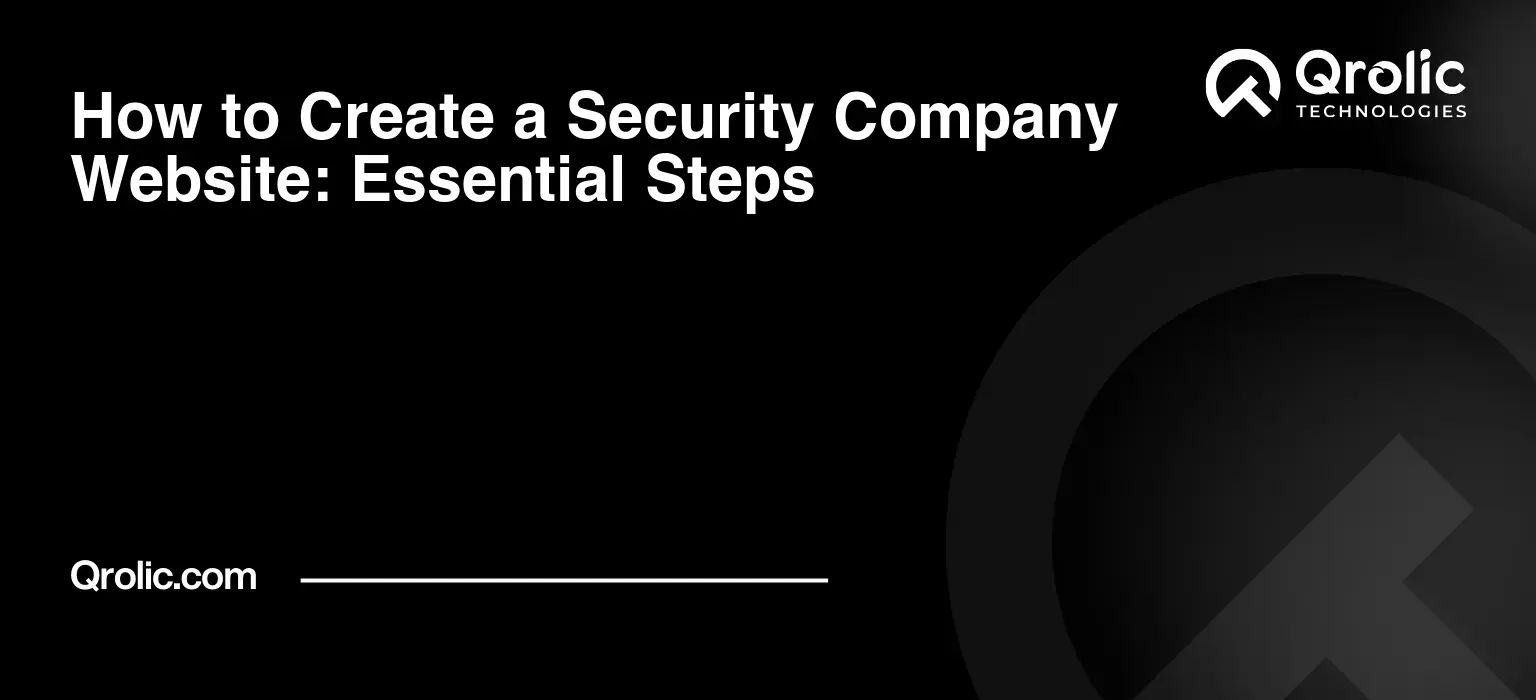Creating a strong online presence is paramount for any business, and security companies are no exception. In an industry built on trust and reliability, your website serves as the digital storefront, building confidence and attracting new clients. This comprehensive guide outlines the essential steps for creating a high-performing security company website, ensuring it’s not just visually appealing, but also functional, informative, and optimized for search engines.
Quick Summary:
- Define your brand, audience, and goals.
- Build a secure, user-friendly website.
- Create valuable content and optimize for SEO.
- Promote, convert leads, and maintain ongoing.
Table of Contents
- 1. Defining Your Security Company’s Brand and Online Strategy
- 1.1. Identifying Your Target Audience: Who Are You Trying to Reach?
- 1.2. Defining Your Unique Value Proposition (UVP): What Makes You Different?
- 1.3. Setting Measurable Goals: What Do You Want to Achieve with Your Website?
- 1.4. Competitor Analysis: Understanding the Landscape
- 2. Website Design and Development: Building a User-Friendly and Secure Platform
- 2.1. Choosing a Domain Name: Your Online Address
- 2.2. Selecting a Web Hosting Provider: Your Website’s Foundation
- 2.3. Choosing a Content Management System (CMS): Powering Your Website
- 2.4. Designing a User-Friendly Website: Enhancing the User Experience (UX)
- 2.5. Security Considerations: Protecting Your Website and Visitors
- 3. Content Creation: Providing Valuable Information and Building Trust
- 3.1. Essential Pages: Providing Key Information
- 3.2. Content Marketing Strategy: Attracting and Engaging Your Audience
- 3.3. Optimizing Content for Search Engines (SEO): Improving Visibility
- 3.4. Building Trust and Credibility: Showcasing Expertise and Authority
- 4. Lead Generation and Conversion: Turning Visitors into Customers
- 4.1. Call-to-Actions (CTAs): Guiding Visitors to Take Action
- 4.2. Contact Forms: Making it Easy to Connect
- 4.3. Landing Pages: Focusing on Specific Offers
- 4.4. Live Chat: Providing Real-Time Assistance
- 4.5. Tracking and Analytics: Measuring Performance and Optimizing Results
- 5. Promoting Your Security Company Website: Driving Traffic and Building Awareness
- 5.1. Search Engine Optimization (SEO): Improving Organic Visibility
- 5.2. Social Media Marketing: Engaging with Your Target Audience
- 5.3. Email Marketing: Nurturing Leads and Building Relationships
- 5.4. Pay-Per-Click (PPC) Advertising: Driving Targeted Traffic
- 5.5. Local SEO: Reaching Local Customers
- 6. Qrolic Technologies and Your Security Company Website
- 7. Ongoing Maintenance and Optimization: Ensuring Long-Term Success
1. Defining Your Security Company’s Brand and Online Strategy
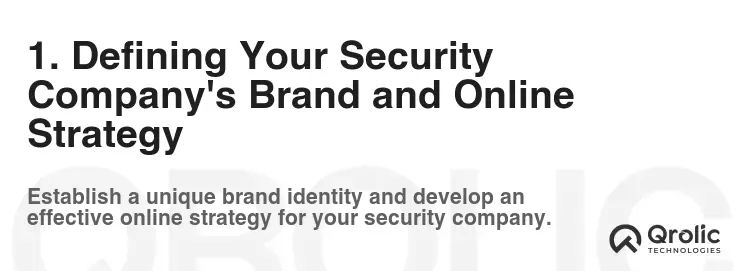
Before diving into the technical aspects of website creation, it’s crucial to define your brand identity and develop a clear online strategy. This foundational step sets the stage for a website that accurately represents your company’s values and achieves its business objectives.
1.1. Identifying Your Target Audience: Who Are You Trying to Reach?
Understanding your target audience is the cornerstone of any successful marketing effort. For a security company, this involves identifying the specific demographics, industries, and needs you aim to serve. Consider the following:
- Residential Clients: Homeowners seeking security systems, alarm monitoring, and personal safety solutions. What are their concerns – burglary, fire, medical emergencies? What are their demographics (age, income level, location)?
- Commercial Clients: Businesses requiring security services for their premises, assets, and employees. What industries do you specialize in (retail, construction, manufacturing)? What are their specific security needs – access control, video surveillance, cybersecurity?
- Government Agencies: Public sector entities with unique security requirements. What specific services do they need (perimeter security, data protection, risk assessment)?
Knowing your target audience allows you to tailor your website’s content, design, and messaging to resonate with their specific needs and concerns. This targeted approach will significantly improve engagement and conversion rates.
1.2. Defining Your Unique Value Proposition (UVP): What Makes You Different?
In a competitive market, it’s essential to articulate what sets your security company apart. Your UVP is a clear statement that explains the benefits you offer to clients and why they should choose you over competitors.
Consider the following questions:
- Expertise: Do you specialize in a particular area of security (e.g., cybersecurity, executive protection, event security)?
- Technology: Do you use cutting-edge technology and innovative solutions?
- Customer Service: Do you offer personalized service and 24/7 support?
- Experience: Do you have a proven track record of success and satisfied clients?
- Certifications: Are you certified by relevant industry organizations, demonstrating your expertise and commitment to quality?
Clearly communicate your UVP throughout your website, highlighting your strengths and showcasing how you can provide superior security solutions.
1.3. Setting Measurable Goals: What Do You Want to Achieve with Your Website?
Establish clear and measurable goals to track the success of your website. Common goals for a security company website include:
- Lead Generation: Increase the number of qualified leads generated through online inquiries, contact forms, and quote requests.
- Brand Awareness: Enhance brand recognition and establish your company as a trusted security provider in your target market.
- Customer Acquisition: Convert website visitors into paying customers.
- Customer Retention: Provide valuable resources and support to existing clients, fostering loyalty and repeat business.
- Online Sales (if applicable): Sell security products or services directly through your website (e.g., DIY security kits, online training courses).
By setting specific, measurable, achievable, relevant, and time-bound (SMART) goals, you can track your progress and make data-driven decisions to optimize your website for maximum impact.
1.4. Competitor Analysis: Understanding the Landscape
Before building your website, it’s crucial to analyze your competitors’ online presence. This includes identifying their strengths and weaknesses, understanding their target audience, and evaluating their website design, content, and SEO strategies.
- Identify your main competitors: Search online for security companies in your geographic area or those targeting the same industries as you.
- Analyze their websites: Evaluate their design, navigation, content, services offered, pricing, and customer testimonials.
- Assess their SEO performance: Use tools like SEMrush or Ahrefs to analyze their keyword rankings, backlinks, and overall search engine visibility.
By understanding the competitive landscape, you can identify opportunities to differentiate your security company and create a website that stands out from the crowd.
2. Website Design and Development: Building a User-Friendly and Secure Platform
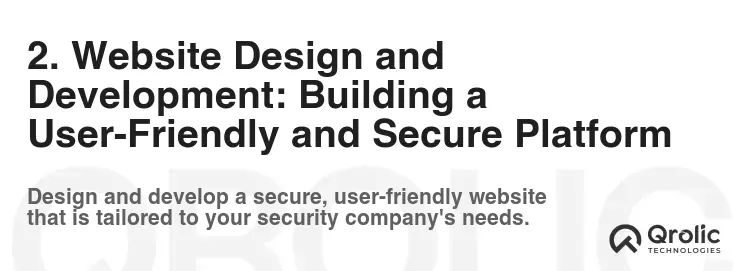
The design and development phase is where your vision comes to life. Focus on creating a website that is not only visually appealing but also user-friendly, secure, and optimized for performance.
2.1. Choosing a Domain Name: Your Online Address
Your domain name is your website’s address on the internet and plays a crucial role in branding and search engine optimization. Choose a domain name that is:
- Relevant: Reflects your company name or the services you offer.
- Memorable: Easy to remember and pronounce.
- Short: Concise and easy to type.
- .com Extension: Preferably a .com extension, as it is the most recognized and trusted.
- Available: Check the availability of your desired domain name through a domain registrar like GoDaddy or Namecheap.
Consider incorporating relevant keywords into your domain name (e.g., “citysecurity.com,” “homesecurityservices.com”) to improve search engine visibility. However, prioritize readability and memorability.
2.2. Selecting a Web Hosting Provider: Your Website’s Foundation
Your web hosting provider is responsible for storing your website’s files and making them accessible to visitors. Choose a reliable and secure hosting provider that offers:
- Uptime Guarantee: Ensures your website is available to visitors most of the time.
- Security Features: Provides protection against hacking, malware, and other security threats.
- Scalability: Allows you to easily increase your server resources as your website grows.
- Customer Support: Offers responsive and helpful technical support.
Popular web hosting providers include SiteGround, Bluehost, and HostGator. Consider a hosting provider that specializes in security and offers features like SSL certificates, firewalls, and intrusion detection systems.
2.3. Choosing a Content Management System (CMS): Powering Your Website
A CMS allows you to easily manage your website’s content without requiring technical expertise. Popular CMS platforms include:
- wordpress: The most popular CMS, known for its flexibility, ease of use, and extensive library of plugins and themes.
- Joomla: A powerful CMS suitable for complex websites with custom functionality.
- Drupal: A highly secure and scalable CMS ideal for government and enterprise websites.
For most security companies, WordPress is an excellent choice due to its ease of use, vast selection of security plugins, and SEO-friendly features.
2.4. Designing a User-Friendly Website: Enhancing the User Experience (UX)
A user-friendly website is essential for attracting and retaining visitors. Focus on creating a website that is:
- Easy to Navigate: Use clear and intuitive navigation menus to help visitors find what they’re looking for quickly.
- Mobile-Friendly: Ensure your website is responsive and adapts to different screen sizes, providing a seamless experience on all devices.
- Visually Appealing: Use high-quality images, videos, and graphics to create a professional and engaging design.
- Fast Loading: Optimize your website’s loading speed to prevent visitors from leaving due to frustration.
- Accessible: Ensure your website is accessible to users with disabilities, following accessibility guidelines like WCAG.
Consider hiring a professional web designer to create a custom website design that reflects your brand identity and meets your specific needs.
2.5. Security Considerations: Protecting Your Website and Visitors
Security is paramount for a security company’s website. Implement the following security measures to protect your website and your visitors’ data:
- SSL Certificate: Install an SSL certificate to encrypt data transmitted between your website and visitors’ browsers.
- Strong Passwords: Use strong and unique passwords for all website accounts.
- Regular Backups: Back up your website’s files and database regularly to prevent data loss.
- Security Plugins: Install security plugins like Wordfence or Sucuri to protect against malware, hacking attempts, and other security threats.
- Firewall: Implement a web application firewall (WAF) to filter malicious traffic and prevent attacks.
- Regular Updates: Keep your CMS, themes, and plugins up to date to patch security vulnerabilities.
- Data Privacy: Comply with data privacy regulations like GDPR and CCPA and clearly communicate your privacy policy on your website.
A secure website builds trust with visitors and protects your company’s reputation.
3. Content Creation: Providing Valuable Information and Building Trust
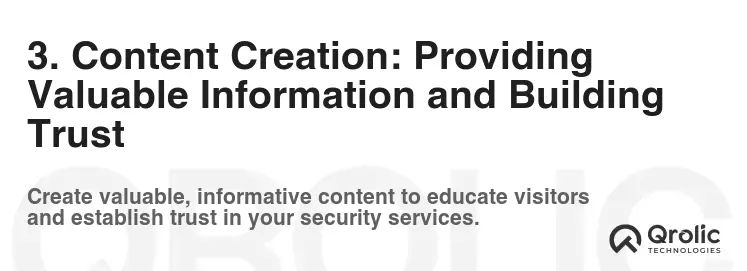
Compelling and informative content is essential for attracting visitors, building trust, and converting leads. Focus on creating content that addresses your target audience’s needs and showcases your expertise.
3.1. Essential Pages: Providing Key Information
Include the following essential pages on your security company website:
- Homepage: Provides an overview of your company, services, and value proposition.
- About Us: Tells your company’s story, highlighting your mission, values, and team.
- Services: Describes the specific security services you offer (e.g., alarm systems, surveillance, access control).
- Industries Served: Highlights the industries you specialize in (e.g., retail, construction, healthcare).
- Case Studies: Showcases your successful projects and demonstrates your expertise.
- Testimonials: Features positive feedback from satisfied clients.
- Blog: Provides valuable information, tips, and insights on security topics.
- Contact Us: Includes a contact form, phone number, email address, and physical address (if applicable).
- Privacy Policy: Explains how you collect, use, and protect visitor data.
- Terms of Service: Outlines the terms and conditions for using your website and services.
Each page should be optimized for relevant keywords and designed to provide a clear and concise message.
3.2. Content Marketing Strategy: Attracting and Engaging Your Audience
A content marketing strategy is essential for attracting and engaging your target audience. Develop a plan for creating and distributing valuable content that addresses their needs and interests.
- Keyword Research: Identify the keywords your target audience uses when searching for security services online.
- Blog Posts: Create informative and engaging blog posts on topics related to security, such as:
- “Top 5 Security Threats Facing Businesses in 2024”
- “How to Choose the Right Security System for Your Home”
- “Cybersecurity Tips for Small Businesses”
- “The Benefits of Video Surveillance for Retail Stores”
- Case Studies: Showcase your successful projects and demonstrate your expertise.
- White Papers: Provide in-depth analysis and insights on specific security topics.
- Ebooks: Offer comprehensive guides on various security solutions.
- Infographics: Present complex information in a visually appealing and easy-to-understand format.
- Videos: Create engaging videos that showcase your services, provide security tips, or feature customer testimonials.
Promote your content through social media, email marketing, and other channels to reach a wider audience.
3.3. Optimizing Content for Search Engines (SEO): Improving Visibility
Search engine optimization (SEO) is the process of optimizing your website and content to rank higher in search engine results pages (SERPs). Implement the following SEO best practices:
- Keyword Research: Identify relevant keywords and incorporate them naturally into your website content.
- On-Page Optimization: Optimize your website’s title tags, meta descriptions, headings, and image alt text with relevant keywords.
- Content Optimization: Create high-quality, informative, and engaging content that satisfies user intent.
- Link Building: Build backlinks from other reputable websites to improve your website’s authority and ranking.
- Mobile Optimization: Ensure your website is mobile-friendly and provides a seamless experience on all devices.
- Page Speed Optimization: Optimize your website’s loading speed to improve user experience and search engine ranking.
- Schema Markup: Implement schema markup to provide search engines with more information about your website and content.
SEO is an ongoing process that requires consistent effort and monitoring.
3.4. Building Trust and Credibility: Showcasing Expertise and Authority
Building trust and credibility is essential for attracting and retaining clients in the security industry. Implement the following strategies:
- Showcase Certifications and Accreditations: Display your certifications and accreditations from reputable industry organizations.
- Feature Customer Testimonials: Include positive feedback from satisfied clients on your website.
- Highlight Awards and Recognition: Showcase any awards or recognition your company has received.
- Provide Expert Advice: Share your expertise through blog posts, articles, and other content formats.
- Offer Free Resources: Provide valuable free resources such as checklists, templates, and guides.
- Engage with Your Audience: Respond to comments and questions on your website and social media channels.
- Be Transparent: Clearly communicate your company’s values, mission, and policies.
Building trust and credibility takes time and effort, but it is essential for establishing your security company as a trusted and reliable provider.
4. Lead Generation and Conversion: Turning Visitors into Customers
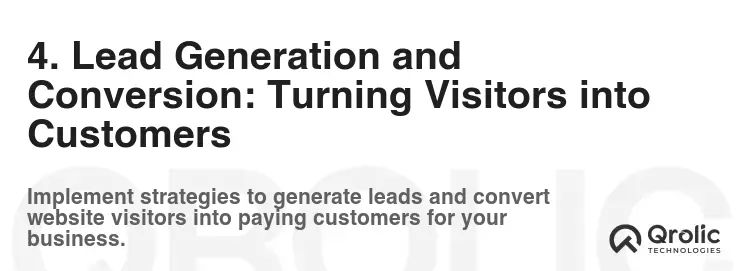
The ultimate goal of your security company website is to generate leads and convert them into paying customers. Implement the following strategies to optimize your website for lead generation and conversion:
4.1. Call-to-Actions (CTAs): Guiding Visitors to Take Action
A call-to-action (CTA) is a button, link, or message that encourages visitors to take a specific action, such as:
- Request a Quote: “Get a Free Security Consultation”
- Contact Us: “Speak to a Security Expert”
- Download a Guide: “Download Our Free Security Checklist”
- Sign Up for a Newsletter: “Stay Informed with Our Security Newsletter”
- Learn More: “Explore Our Security Solutions”
Place CTAs strategically throughout your website, including on your homepage, service pages, blog posts, and landing pages. Use clear and concise language that emphasizes the benefits of taking action.
4.2. Contact Forms: Making it Easy to Connect
A contact form allows visitors to easily submit inquiries or request information. Include a contact form on your contact us page and consider adding forms to other relevant pages, such as service pages and landing pages.
- Keep it Simple: Ask for only the essential information (name, email address, phone number, and message).
- Use Captcha: Implement a captcha to prevent spam submissions.
- Provide a Confirmation Message: Display a confirmation message after the form is submitted successfully.
- Respond Promptly: Respond to inquiries promptly and professionally.
A well-designed contact form makes it easy for visitors to connect with your security company and helps you capture valuable leads.
4.3. Landing Pages: Focusing on Specific Offers
A landing page is a dedicated page designed to promote a specific offer, such as a free consultation, a discount, or a download. Landing pages are typically used in conjunction with online advertising or email marketing campaigns.
- Clear Headline: Use a clear and concise headline that highlights the offer.
- Compelling Copy: Write persuasive copy that explains the benefits of the offer.
- High-Quality Images: Use high-quality images or videos to showcase the offer.
- Clear Call-to-Action: Include a prominent CTA that encourages visitors to take action.
- Remove Distractions: Remove unnecessary navigation elements to keep visitors focused on the offer.
A well-designed landing page can significantly improve conversion rates and help you generate more leads.
4.4. Live Chat: Providing Real-Time Assistance
Live chat allows you to provide real-time assistance to visitors on your website. This can be particularly helpful for answering questions, addressing concerns, and guiding visitors through the sales process.
- Choose a Reliable Provider: Select a live chat provider that offers features such as chat routing, canned responses, and reporting.
- Train Your Staff: Train your staff on how to use the live chat software and how to handle common inquiries.
- Monitor Chat Activity: Monitor chat activity to ensure that visitors are receiving timely and helpful responses.
- Promote Live Chat: Promote your live chat service on your website and social media channels.
Live chat can improve customer satisfaction, increase conversion rates, and generate valuable leads.
4.5. Tracking and Analytics: Measuring Performance and Optimizing Results
Tracking and analytics are essential for measuring the performance of your website and optimizing your marketing efforts. Implement the following tracking and analytics tools:
- Google Analytics: Track website traffic, user behavior, and conversion rates.
- Google Search Console: Monitor your website’s performance in Google search results.
- Heatmaps: Visualize user behavior on your website, such as where they click and how far they scroll.
- Call Tracking: Track the source of phone calls generated from your website.
Analyze your data regularly to identify areas for improvement and optimize your website for maximum impact.
5. Promoting Your Security Company Website: Driving Traffic and Building Awareness
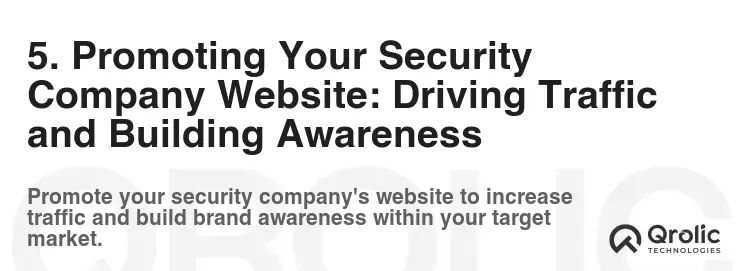
Once your website is live, it’s essential to promote it to drive traffic and build awareness. Implement the following marketing strategies:
5.1. Search Engine Optimization (SEO): Improving Organic Visibility
Continue to optimize your website for search engines to improve your organic visibility. Focus on:
- Keyword Research: Regularly update your keyword research to identify new opportunities.
- Content Marketing: Create high-quality, informative, and engaging content that targets relevant keywords.
- Link Building: Build backlinks from other reputable websites to improve your website’s authority and ranking.
- Technical SEO: Ensure your website is technically sound and optimized for search engines.
SEO is an ongoing process that requires consistent effort and monitoring.
5.2. Social Media Marketing: Engaging with Your Target Audience
Use social media to engage with your target audience, share valuable content, and promote your security services.
- Choose the Right Platforms: Focus on the social media platforms that are most popular with your target audience.
- Create Engaging Content: Share informative, engaging, and visually appealing content that resonates with your audience.
- Engage with Your Followers: Respond to comments and questions, participate in relevant conversations, and build relationships with your followers.
- Run Social Media Ads: Use social media ads to reach a wider audience and promote your security services.
Social media marketing can help you build brand awareness, generate leads, and drive traffic to your website.
5.3. Email Marketing: Nurturing Leads and Building Relationships
Email marketing is a powerful tool for nurturing leads, building relationships, and promoting your security services.
- Build an Email List: Offer valuable incentives, such as free downloads or discounts, to encourage visitors to sign up for your email list.
- Segment Your List: Segment your email list based on demographics, interests, or behaviors to send targeted messages.
- Create Engaging Emails: Write compelling email copy that highlights the benefits of your security services.
- Automate Your Emails: Use email automation to send welcome emails, follow-up emails, and other triggered messages.
Email marketing can help you generate leads, nurture relationships, and drive sales.
5.4. Pay-Per-Click (PPC) Advertising: Driving Targeted Traffic
Pay-per-click (PPC) advertising allows you to drive targeted traffic to your website by paying for ads that appear on search engine results pages (SERPs) and other websites.
- Keyword Research: Identify the keywords your target audience uses when searching for security services online.
- Create Compelling Ads: Write persuasive ad copy that highlights the benefits of your security services.
- Target Your Ads: Target your ads based on demographics, interests, and location.
- Track Your Results: Track your ad performance to optimize your campaigns and improve your ROI.
PPC advertising can be a cost-effective way to drive targeted traffic to your website and generate leads.
5.5. Local SEO: Reaching Local Customers
Local SEO is the process of optimizing your website and online presence to rank higher in local search results.
- Claim Your Google Business Profile: Claim and optimize your Google Business Profile to improve your visibility in local search results.
- Get Local Citations: List your business in online directories and review sites.
- Encourage Customer Reviews: Encourage satisfied customers to leave positive reviews on your Google Business Profile and other review sites.
- Optimize Your Website for Local Keywords: Incorporate local keywords into your website content, title tags, and meta descriptions.
Local SEO can help you reach local customers who are searching for security services in your area.
6. Qrolic Technologies and Your Security Company Website
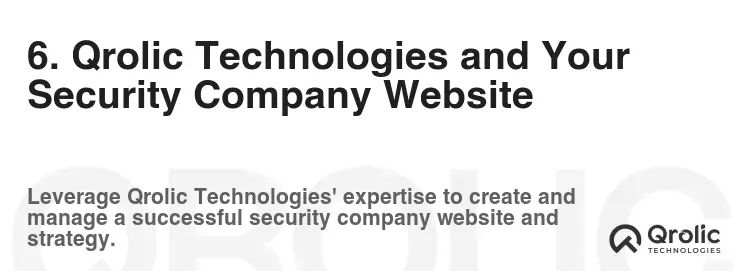
Qrolic Technologies (https://qrolic.com/) understands the unique needs of the security industry when it comes to website development and digital marketing. They offer a range of services that can help your security company create a powerful online presence:
- Custom Website Design and Development: Qrolic Technologies can create a custom website design that reflects your brand identity and meets your specific needs.
- SEO Services: Their SEO experts can help you optimize your website to rank higher in search engine results pages (SERPs).
- Content Marketing: Qrolic Technologies can help you create and distribute valuable content that attracts and engages your target audience.
- PPC Advertising: Their PPC specialists can help you create and manage effective PPC campaigns that drive targeted traffic to your website.
- Social Media Marketing: Qrolic Technologies can help you develop and implement a social media marketing strategy that builds brand awareness and generates leads.
- Website Security Audits: Qrolic Technologies offer comprehensive website security audits to identify vulnerabilities and protect your website from cyber threats.
By partnering with Qrolic Technologies, you can ensure that your security company website is not only visually appealing but also functional, informative, and optimized for search engines. Their expertise in website design, development, and digital marketing can help you generate leads, build trust, and grow your business.
7. Ongoing Maintenance and Optimization: Ensuring Long-Term Success
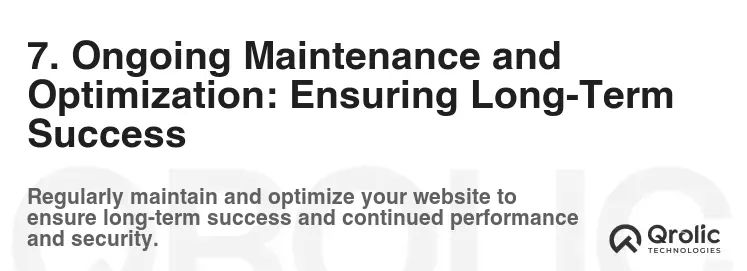
Creating a security company website is not a one-time task. It requires ongoing maintenance and optimization to ensure long-term success.
- Regularly Update Your Website: Keep your CMS, themes, and plugins up to date to patch security vulnerabilities and ensure compatibility.
- Monitor Your Website’s Performance: Track your website’s traffic, user behavior, and conversion rates to identify areas for improvement.
- Test and Optimize Your Website: Experiment with different designs, layouts, and content to improve user experience and conversion rates.
- Stay Up-to-Date with the Latest Trends: Stay informed about the latest trends in website design, development, and digital marketing.
- Invest in Ongoing Training: Provide ongoing training to your staff to ensure they have the skills and knowledge to maintain and optimize your website.
By investing in ongoing maintenance and optimization, you can ensure that your security company website continues to generate leads, build trust, and grow your business for years to come.
In conclusion, creating a successful security company website requires careful planning, execution, and ongoing maintenance. By following the essential steps outlined in this guide, you can create a website that accurately represents your company’s values, attracts new clients, and establishes your company as a trusted security provider. Remember to leverage the expertise of companies like Qrolic Technologies to maximize your online presence and achieve your business goals.
